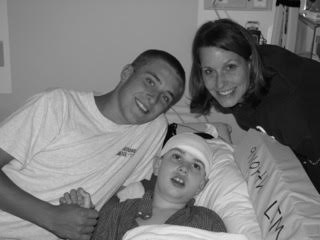Here is what I would like you to know.
We are mentally and physically exhausted. Often we have not eaten, slept or showered and we appear or at least feel disheveled. Of course, it seems ridiculous to even care, but some of us do. We are conscious of how we present ourselves to you and want to feel like an equal member of the care team. By default, we feel at a disadvantage and feel somewhat “smaller” than you, based on our appearance alone.
We wait and wait and wait for you to round. We plan our entire day around when you might come by, forgoing food, shower or a break. It’s that important to us to be there and be present. We are desperate for information.
I don’t care if you like me, though that is certainly preferable and helpful. It is also preferable and helpful if I like you. I care that you respect me. I care that you will listen.
I deeply respect your academic and clinical knowledge. Please, in turn, respect my parenting knowledge. Do not assume you know more than I do about my child’s diagnosis. Or, know what might be best for my child more than I do. You study this.
I live it.
Please do not talk about my child or our situation as if I am not standing right there.
I want to be included in your discussions as much as possible as they pertain to my child’s status and in making a treatment plan.
Any one nurse can make our stay that much better or worse. They truly make the most difference. The same with the attending physician. Everyone in between is just more people. The nurse, because they are our one constant. They can be kind, gruff, our best ally or our most dreaded person entering the room. The attending, because they make the final decisions, and we may or may not be on the same page. If we know or are known to the attending, it is a huge advantage. If not, it takes time to develop mutual respect. You can make a positive difference if you help to bridge that link and act as a good communicator.
Please treat my child like a person, not a textbook body. Have empathy.
Please listen to what I am telling you. Often my instinct is important. Trust my feedback, observation and opinion, especially if we have been at this awhile.
Share your thoughts with me. I respect your knowledge and want to learn from you. Just like I want you to learn about my child from me.
I listen and hear everything and I read my child’s chart when I can. When I can’t hear what you are saying on rounds, I watch, trying to interpret body language. There is nothing worse than feeling left out of the discussion about your own child.
The smallest personal comment or gesture can make a big difference.
If you don’t know or don’t have an answer, or if you have bad news, be honest. Be direct and be honest. Anything else is unfair and makes things worse. Showing honesty and humility makes me like and trust you more.
Please remember that I have a life beyond the hospital, including a spouse and another child. Being pulled away from home, planned or unplanned, can be isolating and a strain.
I see and feel the pressure of the residents. I cringe for your sake when you make a mistake or are put on the spot, knowing that you are being constantly scrutinized. I watch how you all treat each other. I respect the relentless pressure of the job you are doing and what is at stake. I am curious about you. I suppose and suspect that you feel a similar sense of stress and fatigue – just for different reasons.
Sometimes I value the residents the most on the team. You are younger, fresher, often more current and tend to think outside the box. You are generally more accessible and open minded than more senior physicians. If you have or take the time to engage with a capable, interested parent, it can lead to the most effective outcome. That is appreciated. I am always appreciating, even if I don’t always show it.
Thank you for reading, and for all that you do to care for my child.
Barb, Mother of Jake
View Barb and her husband John and son Jake sharing their story [here].
